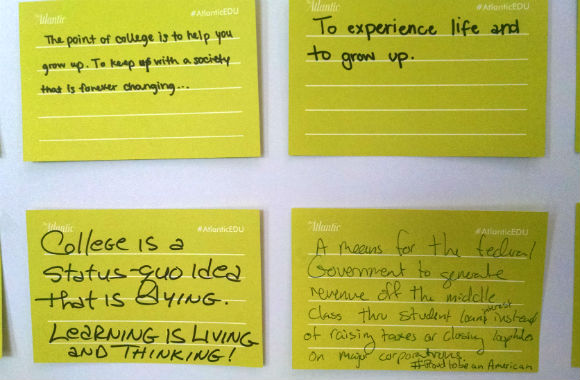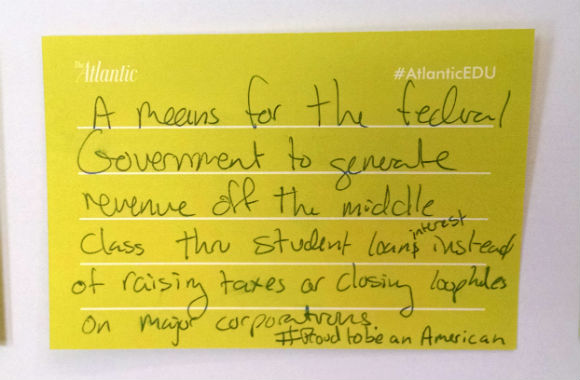
Administrator: ‘You’re actually responding and hurting people’ by speaking
WASHINGTON – The U.S. Constitution does not mean anything to the recent college graduates who addressed The Atlantic Education Summit on Wednesday.
Administrators who followed them on the stage seemed eager to let them define core values such as free speech and even the notion of “rights” however they wanted.
University of Alabama alumna Amanda Bennett, featured in a recent video with black students talking about racism at UA, said she doesn’t believe the First Amendment means anything because African Americans didn’t have free speech to start.
Bennett said her authority on the subject is radical black feminist bell hooks, and she praised social media because it’s the one venue where black people can’t be “silenced.”
Asked by moderator Vann Newkirk, staff writer at The Atlantic, whether one person’s harassment is another person’s free speech, Bennett said she only supports “productive free speech.”
Clifton Kinnie, a current student at Howard University, said he was wary of that view because even the supporters of presumptive Republican presidential nominee Donald Trump think his speech is productive. “We have to define” what constitutes free speech, Kinnie said: If he is going to protest he wants to make sure “it doesn’t marginalize another group.”
“I push back on the notion of rights” because it really means who has “access to inclusion” and who is excluded, said Keish Kim, an undocumented Asian student who recently graduated from Syracuse. Free speech for her is simply “necessary action” for “survival,” not a constitutional principle, Kim said: Injustice prompts “an action I had to do to survive.”
It’s not surprising that students would tolerate only “productive free speech” because they see it through a “conception of community,” said Yale University Prof. Alicia Schmidt Camacho. Students must be able to “participate fully” by feeling included and supported, and administrators must “break down fears and barriers” for that to happen.
Administrators must acknowledge that speech injures people and “you’re actually defining somebody,” said Ben Sifuentes-Jáuregui, vice chancellor for academic affairs at Rutgers University. “You’re actually responding and hurting people.”
The much-ballyhooed “chalkening” incident at Emory University, in which some students were fearful when they saw pro-Donald Trump chalkings on campus, was “really mischaracterized in the media,” said Ajay Nair, dean of campus life. He said Emory students were protesting “the political and social climate” of the United States, and “expressing their concern about what ‘Trump 2016’ means to them.”
RELATED: Trump chalking by College Republicans is a ‘hate crime,’ black students claim
In responding to offensive speech, “it’s not that you tell people how to think or what to think” but ensuring the speaker knows “what the community’s values are,” Nair said. Administrators need to think about how “speech that ignites a community” hits people of color the hardest, he said. Leaders also must help these marginalized student learn how to “speak to the heritage of silencing” they have suffered, said Camacho.
Asked by moderator Alex Wagner, senior editor at The Atlantic, if campuses “overcorrect” as students become more sensitive and if that effectively marginalizes conservative voices, Nair said administrators must do better at encouraging debate on “the impossible conversations.”
RELATED: UT-Chattanooga student senator pressured to resign over pro-Trump chalking
But they must particularly prepare marginalized students for those conversations because “oftentimes they are the ones under attack,” Nair said.
Yale faculty can learn from students of color and low-income learners because they are thinking “more intersectionally” and more intelligently than their elders, Camacho said: “They’ve lived more complicated lives.”
RELATED: Emory University snowflakes ‘in pain’ after pro-Trump graffiti appears on campus
Like The College Fix on Facebook / Follow us on Twitter
IMAGE: pathdoc/Shutterstock









Please join the conversation about our stories on Facebook, Twitter, Instagram, Reddit, MeWe, Rumble, Gab, Minds and Gettr.